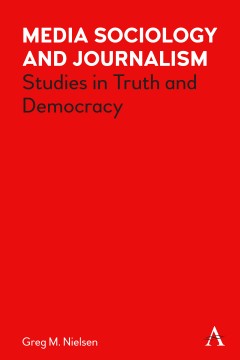Media Sociology and Journalism
Studies in Truth and Democracy
By Greg Nielsen
- About This Book
- Reviews
- Author Information
- Series
- Table of Contents
- Links
- Podcasts
About This Book
Media Sociology and Journalism is a dialogue on the kind of society we find ourselves in as defined through news media and politics, and as seen in contemporary sociological theory. As we work through opposing visions of the global pandemic and an economic depression as well as solutions to racial reckoning, we need to remember we are navigating inside a political and media storm that has raged around the world since the unexpected results of the 2016 U.S election and Brexit Referendum. Deregulation, climate change, forced migrations, and inequality are only some of the topics on which opposing alt right, progressives, and moderates are divided. Journalism, politics and contemporary sociological theory are examined through their interplay and respective strengths and weaknesses in assessing the tenacity of the many deeply opposing claims where each side takes the other’s “truth” to be an existential threat.
The relation between truth and democracy as a regime of power and type of society has always been fragile, often tenuous, and even irrelevant at times. We are nonetheless in a moment where journalists, politicians and social scientists are continually perplexed as to what to do with the denial of basic facts they are expected to trust in order to help create democracy. Post-truth attitudes, the rise of authoritarianism, fake news, conspiracy theories, neoliberalism, nihilism, white nationalism are all threats to democracy but so are repetitive mainstream journalistic narrative strategies that exclude subaltern subjects they report on as the first audience they imagine in writing reports and opinions. Case studies of immigration, urban poverty, and regulating cultural and religious difference are selected to show patterns of hospitality, conditional tolerance or recognition that journalists frame for audiences in ways that help define the public dialogue on welcoming, acceptance, or rejection of others.
A dialogical critique of the gaps between how social actors are represented in journalism, politics and sociology versus how they might see themselves is the first step toward an alternative way of creating democratic society.
Reviews
“Although focused on journalistic practices, this deeply original and timely work is of far wider interest. In the face of what the author terms ‘fake populism’, the analysis moves through a series of sophisticated readings of normative political theory, contemporary sociological theorizing and media studies, and on to a set of empirical studies of leading newspapers and their treatment of a number of pressing issues. Coursing through the analysis lies a deeply ethical questioning rooted in the dialogics of the Russian philosopher Mikhail Bakhtin. Is it possible, the author asks, to have a journalism that speaks with, and does justice to the experience of, those subjects outside the newspapers’ projected audience who are presented as carriers of urgent social problems and potential targets of political exclusion? And behind this question lies another, that of a dialogic democracy, one that, without having to give up a concern with truth, would remain inclusive, even as it seeks to bring different, conflicting viewpoints into conversation with each other” — Brian C.J. Singer, Senior Scholar, Glendon College, York University.
“Media Sociology and Journalism: Studies in Truth and Democracy by Greg Nielsen is a must-read book for everyone who intends to understand the emergence of new political scenarios in the first decades of the twenty-first century and their relations with media and journalism in contexts of disinformation and digital cultures” — RafizaVarão Professor of Ethics and Journalism at the University of Brasília.
“In his outstanding book, Nielsen addresses the fragility of democracy’s openness and its implications for media today. He first exposes how certain media and other sources use that fragility to misrepresent their anti-democratic practices as democratic. He then demonstrates compellingly that his innovative notions of ‘dialogic journalism’ and inclusive ‘implied audiences’ are necessary counters to those anti-democratic threats. A must read for our media age” — Fred Evans, Professor Emeritus, Dept. of Philosophy, Duquesne University.
“Media Sociology and Journalism: Studies in Truth and Democracy” by Greg Nielsen is a must-read book for everyone who intends to understand the emergence of new political scenarios in the first decades of the 21st century and their relations with media and journalism in contexts of disinformation and digital cultures. — Rafiza Varão Professor of Ethics and Journalism at the University of Brasília
Author Information
Greg M. Nielsen is a professor of sociology at Concordia University in Montreal. He studies contemporary society through research on media, journalism, and political and social thought.
Series
Key Issues in Modern Sociology
Table of Contents
Acknowledgments; Introduction: Between the Posts; 1 Fake Populism and News: Freedom versus Democracy; 2 Political Theory: Deliberative, Agonistic and Dialogic Democracy; 3 Contemporary Sociology, Journalism and Society; 4 Acts of Journalism: Truth, Ghosts and Migrant Subjects; 5 Writing Inequality into the Urban Commons; 6 Exotopy and Cultural Boundaries: The Secular Question in Quebec; Conclusion: Deliberative or Dialogic Democracy?; Conclusion: Is Another Journalism Possible?; References; Index
Links
Stay Updated
Information
Latest Tweets



